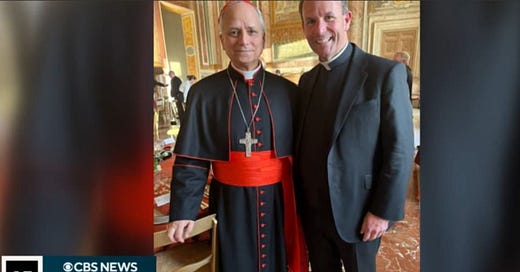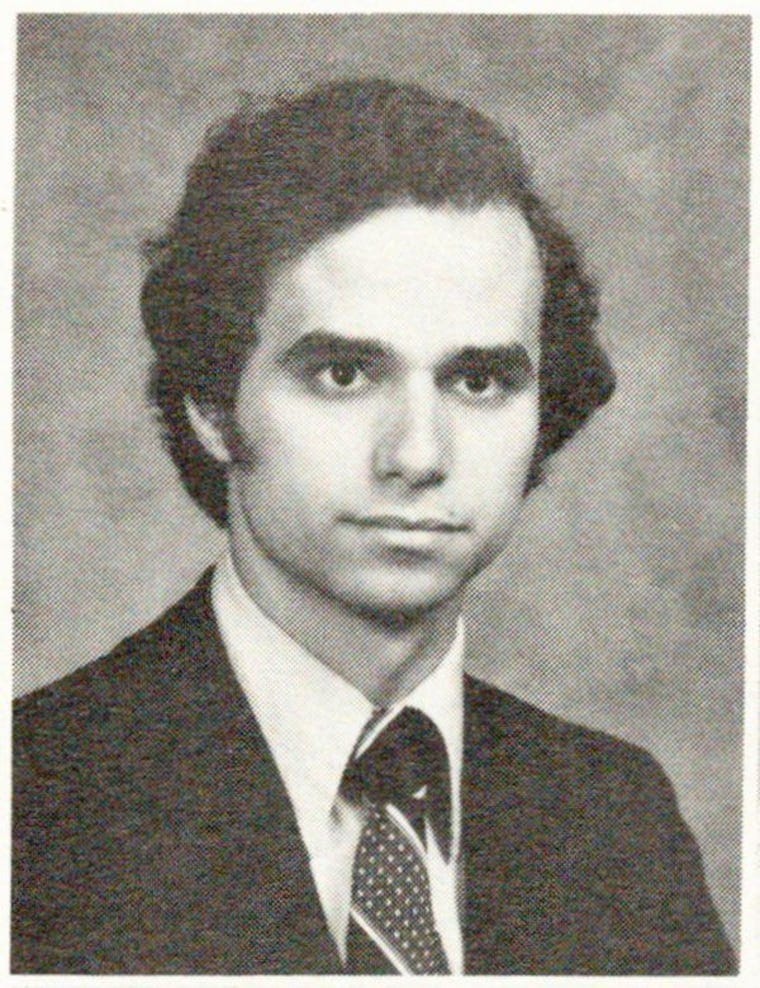Pope Leo XIV Used To Mow Our Lawn
As a 'Nova undergrad, the new Pontiff cut a path towards the papacy through my grade school parish. And the fascist fighter has arrived right on time.
Did I mention that Pope Leo used to cut our grass. How’s that for a hierarchical humble servant?
When I was a kid. I kid you not. Cross my fingers — I mean my heart — and hope to die. Would I tell a lie about the American premier Pontiff? Not sure even a spin in the confessional for old times sake would absolve that.
Before he graduated from Villanova University, a Catholic Augustinian institution, in 1977, newly-inaugurated Pope Leo XIV, when known by his birth name of Robert Francis Prevost, worked a summer pushing a lawn mower and maintaining the grounds at nearby St. Denis Parish in Havertown, PA — my grade school, a mile from my childhood home.
"What people may not know is that a very young Robert Prevost worked at St. Denis Parish in Havertown at the cemetery,” observed Archbishop Nelson Perez of Philadelphia shortly after Prevost was named the late Pope Francis’ replacement and took the name Pope Leo XIV in May.
“He worked there as a groundskeeper when he was a college student. So the present Pope worked for the Archdiocese of Philadelphia at one time. Isn’t that amazing?"
Did I ever bump into the predestined Pontiff? I wondered after hearing the news.
At the same time as the pre-incarnate Pope Leo was maintaining the cemetery grounds at St. Denis Church, the nuns would have been doing their best to maintain me and my younger brother at St. Denis School at the other end of Cemetery Lane.
(I once got pushed around the school yard by a senior nun accusing me of being a “bully” after I punched an older student from the upper school in the jaw and sent him to the hospital. But that’s another story.)
I remember the maintenance guys. I’d spy them through the black wrought iron fence from the car’s backseat, maneuvering their mowers around the gravestones, as my mom or dad drove alongside the cemetery wall down Eagle Road.
Or I’d see them outside the garage next to the rectory as I cut down Cemetery Lane through the graveyard in the morning, late for school again. Perhaps Pope Bob even noticed me, the kid always late for school, and said a prayer for me. Still waiting for an answer to that one.
But wait, we’re talking about summertime when “Father Bob” — as Prevost was known to his fellow Augustinian friars — worked our church grounds, tending to the graves of the deceased, keeping the grass trimmed, and seedlings above the recently departed, watered. That should be required training for all entering the ministry.
So, the only way I would have bumped into him then would have been cutting down the lane on my way across town to my friend Kevin Cochran’s house. Or attending church. And I don’t remember attending church as a kid much in the summertime.
It would be too damn hot. Those black metal pivoting fans mounted on the walls about the church only moved the hot air around. Might as well have been in the confessional box sweating out my latest sins.
Now exactly which summer Pope Bob worked our parish grounds, the record isn’t clear. Perhaps it was the summer of 1976, before he entered his senior year at Villanova and graduated. The Bicentenial summer. That’s how I imagine it anyway. And fittingly so. (Interestingly, St. Denis Parish just celebrated its own bi-centennial earlier this month on June 5.)
The bicentennial summer was the summer we were reminded of the importance of our Declaration of Independance, written and signed 200 years prior in 1776 by the founding fathers in Philadelphia, the city which would serve as the future capitol of the United States and where I’d be born.
Freedom, justice, equality, self rule — the themes that echoed through the declaration — resonated anew that summer. Post Watergate and the Vietnam War (with the tragedies and turbulence of 1968 behind us) the American people had enough of the government abuse of power and were prime for reconnecting with the democratic roots of our ever evolving “Great Experiment.”
My father took us to the watch the July 4 fireworks from the Art Museum steps, the same steps Rocky Balboa ascended and raised his arms in prognosticated metaphorical triumph. I wonder, was Pope Bob there on the steps, too? Seems the sort of thing he would have attended.
All that together — the fireworks, the art museum, Rocky — were iconish reminders of our heritage, of our precious freedom to create, to choose, to live unencumbered by autocratic oppression.
We need such reminders once again — like never before.
And one of those reminders comes just a year prior to the nation’s fast approaching 250 anniversary on July 4, 2026, in the person of Pope Leo XIV, the first ever American-born Pontiff — a south side Chicagoan inaugurated amid unprecedented tyrannical overreach malevolently designed to sabotage the Republic and gut the people’s freedoms for good.
We never appreciate all we have until it’s threatened to be disappeared. This summer, as in many past, promises to be a tumultuous roller coaster ride of a long, hot summer — punctuated with protest against the very sort of tyranny and abuse that our Founding Fathers overcame and warned us to guard against.
The people are waking up, by virtue of the “No Kings” Day protests. There will be no revival without a reckoning. Back in 1976, America needed salvation of sorts after enduring Watergate and Vietnam. And it came in the form a determined peanut farmer from Georgia.
Jimmy Carter would come to the nation’s rescue. And for a brief four years under President Jimmy Carter hope was born anew. A Born Again Christian, who didn’t thump people over the head with an upside down Bible, or wear his faith like a badge or a red MAGA hat, Carter was a breath of fresh air for Americans looking for a leader to trust.
President Carter simply lived his faith, championing Jesus Christ’s “Golden Rule” that commanded his followers to “do unto others as you would have them do to you.” In his 1976 acceptance speech for the democratic presidential nomination, Carter spoke of the need to stop stoking division and reconnect as a people — and that the role of government was to cater to the people, not the powerful elite.
Ever prescient words today — as the congressional Republicans try to cram down our throats a big ugly bill that gifts a few hundred grotesquely rich families hundreds of billions in tax breaks while ending healthcare for 16 million Americans, and deepening the nation’s deficit.
“Love must be aggressively translated into simple justice,” said Carter in his speech at the Democratic convention that summer of 1976. “The test with any government is not how popular it is with the powerful, but how honestly and fairly it deals with those who must depend on it.”
Carter called for universal voter registration, a comprehensive health program for all citizens and an end to discrimination based on race or sex. We’re still working on those.
“Swift arrest and trial, fair, uniform punishment should be expected by anyone who would break our laws,” said Carter. “It's time for our government leaders to respect the law no less than the humblest citizen, so that we can end once and for all a double standard of justice.
“I see no reason why big‐shot crooks should go free and the poor ones go to jail. A special and a proper function of government is just to make it easy for us to do good and difficult for us to do wrong.”
These are all values that a young future Pope at say age 21 or 22, would have absorbed at the time. Prevost would go on to serve more than two decades as a missionary in Peru, where he eventually became a citizen.
During his time in the South American nation, then Bishop Prevost lived with parishioners through a bloody civil war, and a decade-long dictatorship. Three corrupt former Peruvian presidents during that time have been arrested and given prison sentences. Amid, catastrophic flooding, a dengue fever outbreak and the COVID-19 pandemic, the Bishop was there for the people.
"We saw a bishop who put on a helmet, boots and went out to meet people, very close, very, very humble with everyone," said Janinna Sesa, the former Chiclayo director of Caritas, the Catholic Church's international humanitarian aid organization who worked closely with Prevost."From those who held important positions to the most humble of people."
America and the world needs a justice fighter like Pope Leo XIV, whose first words to the awaiting masses outside the Basilica in St. Peter’s Square, Rome in May were “Peace be with you.”
Responding to news of the U.S. airstrikes on nuclear facilities in Iran, Pope Leo XIV on Sunday pleaded with the international community “to stop the tragedy of war before it becomes an irreparable abyss.”
“Today more than ever, humanity cries out and pleads for peace,” the Pope said in remarks following his ‘Angelus reflection’ outside the Vatican. “In this dramatic scenario, which includes Israel and Palestine, the daily suffering of the population — especially in Gaza and other territories — risks being forgotten, even as the urgency for proper humanitarian support becomes ever more pressing.
“There are no distant conflicts when human dignity is at stake,” he said. “War does not solve problems — on the contrary, it amplifies them and inflicts deep wounds on the history of nations that take generations to heal.
“No armed victory can make up for a mother’s grief, a child’s fear, or a stolen future.”
Yeah, the guy who used to cut the grass at my grade school renewed his call for diplomacy and commitment to peace for all the world to hear: “Let diplomacy silence the weapons; let nations shape their future through works of peace, not through violence and bloody conflict.”
Amen to that.






So very cool. Love this!